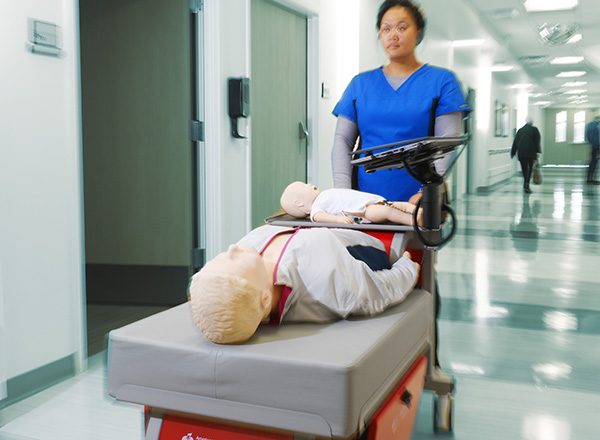Current literature is rich with robust evidence that healthcare providers’ (HCPs) CPR skills decay within weeks to months after the traditional biennial model of BLS training/certification.1 What also decays, or falsely inflates, is not as obvious to measure or quantify, but equally important: HCPs CPR skill confidence, a quiet inner knowledge that one is capable.
“Of course I’m capable of performing CPR; I’m always compliant with my two-year BLS certification.” Sound familiar?
There is a gross and precarious misconception regarding HCPs self-perceived confidence to perform high-quality CPR versus their actual skill performance – an insidious phenomenon of reality versus perception.
In a 2017 study of dental students trained in BLS within the two-year certification requirement, researchers discovered that despite the participants reporting a high level of BLS knowledge and skill confidence, their ability to perform BLS did not predict actual competence. As a result, the authors concluded that neither BLS knowledge or perceived self-efficacy is predictive of real competence.2 Certainly, the findings and conclusion of this study can translate to any discipline of HCPs (nurses, physicians, technicians, etc.) trained via the biennial BLS model.
A wide range of individual variances and levels of CPR skill confidence exists, but let’s focus on the polar ends of this spectrum.
On one side are the HCPs who acknowledge their loss of confidence and inadequacy to perform CPR during an in-hospital cardiac arrest (IHCA) event. This category of HCPs runs the other way when a “code blue” is called and consciously, or unconsciously, avoid jumping in to perform life-saving CPR.
On the opposite end are the HCPs who feel a sense of “false bravado”. This category of HCPs erroneously believes that simply because they are compliant within the two-year BLS certification requirement, they will undoubtedly perform high-quality CPR. However, research demonstrates otherwise. Numerous studies show that despite biennial BLS-compliance, HCP CPR skills often fail to meet the key AHA guideline metrics of compression and ventilation (correct compression fraction, recoil, depth, rate, hand placement, and ventilation volume, rate).1,3 Unfortunately, inflated false confidence does not compensate for poorly deflated CPR skill performance – a perilous combination.
Regardless of which side of the confidence spectrum the HCP resides, the effect will not only negatively impact vital CPR skill performance but also result in detrimental outcomes for the IHCA patient.
However, there is a solution. The Resuscitation Quality Improvement® (RQI®) Program.
In a recent comprehensive study at Illinois Valley Community Hospital (IVCH), the first hospital in Illinois to adopt RQI in 2016, researchers surveyed HCPs confidence levels as a result of participation in RQI two-and-a-half years post-implementation. The results were revealing and encouraging. One of the survey items asked HCPS to rate their ability to perform BLS prior to the RQI program via the biennial BLS model, on a confidence level five-point Likert scale of Strongly Agree to Strongly Disagree. The next item asked HCPs to rate their ability to perform BLS on the same Likert scale after participation in the RQI program.
One hundred thirty-two IVCH HCPs were surveyed. Two pre-post-RQI item results revealed increased confidence levels after participation in the RQI program, as follows:


The number of responses for the combined categories of both Strongly agree and Agree demonstrated an improvement of confidence in HCPs’ ability to perform BLS after participating in the RQI program by a total of 19%.
Another survey item asked HCPs if their BLS skill performance will improve using the RQI in the future. The responses were overwhelmingly favorable with a 78% combined total for both Strongly Agree and Agree, as follows:

| Frequency | Percent | Valid Percent | Cumulative Percent | ||
| Valid | Strongly agree | 34 | 25.8 | 26.0 | 26.0 |
| Agree | 68 | 51.5 | 51.9 | 77.9 | |
| Neither agree or disagree | 24 | 18.2 | 18.3 | 96.2 | |
| Disagree | 5 | 3.8 | 3.8 | 100.0 | |
| Total | 131 | 99.2 | 100.0 | ||
| Missing System Total |
1 132 |
.8 100.0 |
|||
For more information of the impact of RQI at IVCH, the study can be fully accessed in the
Joint Commission Journal of Quality and Patient Safety, titled: Implementation of a Low-Dose, High-Frequency Cardiac Resuscitation Quality Improvement Program in a Community Hospital. Authored by Lorna Rozanski Dudzik, DNP, RN, APN; Debra G. Heard, PhD; Russell E. Griffin, MBA, LP, FP-C; Mary Vercellino, MSN, RN, ACNS-BC, CWON; Amanda Hunt, MS, BSN, RN; Maureen Rebholz, EdD, MSN, RN; Adam Cates
This article was written by Lorna Dudzik, is Assistant Professor, College of Nursing and Health Sciences, Lewis University, Romeoville, Illinois, and AHA ACLS/BLS Instructor and Get With The Guidelines® Resuscitation Data Abstractor, Edward Hospital, Naperville, Illinois.
References
1. American Heart Association. Resuscitation quality improvement annotated bibliography. 2017. https://www.heart.org/idc/groups/heart-public/@wcm/@ecc/documents/downloadable/ucm_459991.pdf
2. Mac Giolla Phadraig C, Ho JD, Guerin S, et al. Neither Basic Life Support knowledge nor self‐efficacy are predictive of skills among dental students. European Journal of Dental Education. 2017;21:187-192.
3. Niles DE, Duval-Arnould J, Skellett S, et al. Characterization of Pediatric In-Hospital Cardiopulmonary Resuscitation Quality Metrics Across an International Resuscitation Collaborative. Pediatric critical care medicine : a journal of the Society of Critical Care Medicine and the World Federation of Pediatric Intensive and Critical Care Societies. 2018;19:421-432.








